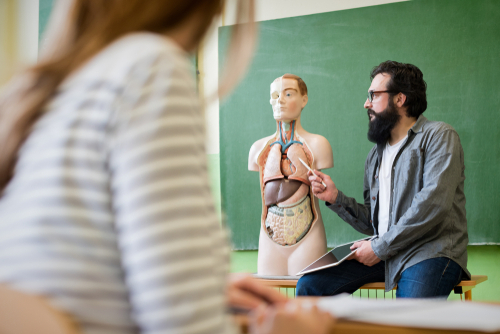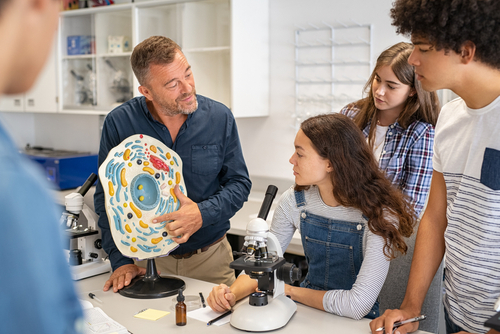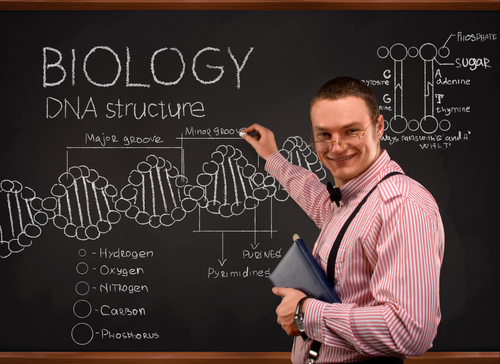
Teaching high school biology is a noble pursuit. You’ll be helping students better understand the world around them. According to US News, employment in the field is relatively stable, due to the increase in the demand for science teachers. That said, there’s no single degree path to take if you plan on being a high school biology teacher.
What Science Degree Should You Pursue?
If you’re looking at how to become a biology teacher, the best course of action is usually to pursue a bachelor’s degree in biology or a closely related life science. Preparing to teach high school is somewhat similar to preparing to teach at the college level. A degree in your chosen subject is generally more important than a degree in education. You can choose either a B.A. or a B.S. in biology. To maximize your employment prospects, make sure you’re getting your degree from an accredited four-year institution. It’s worth noting that while you can earn a B.A. or a B.S. in biology online, you’ll almost certainly need to attend laboratory courses in person.
What Education Degree Should You Pursue?
In order to teach biology or most other subjects at the high school level, you don’t typically need to have a degree in education. However, if you want to teach elementary school science, most states will require a degree in education or a related field.
Even though most states don’t require an education degree to teach high school biology, having some amount of college-level training in teaching can help you stand out in a competitive job market. For students who want to focus on both pedagogy and biology, some institutions offer degrees in biology education. This is a useful, specialized degree program that eliminates the need to pursue a double major.
Double-majoring in biology and education is a more common alternative to earning a degree in biology education. A double major like this one involves a fairly hefty course load, but it could pay off in the future. Double-majoring shows employers that you’re equally serious about your passion for both the sciences and teaching. It also shows that you’re driven and that you have an impressive work ethic.
If you want to try teaching but don’t necessarily want to pursue a degree in education, some colleges and universities offer courses where you can teach alongside an experienced instructor. Through these courses, you gain classroom experience and benefit from the guidance and mentorship of a more experienced instructor.
If you’ve already graduated from college with a biology degree and have just decided you want to teach, you don’t need to go back to school for a teaching degree. Pursuing a post-baccalaureate teaching certificate is a time-saving alternative to getting a second bachelor’s degree. This certificate isn’t a degree, but it can prepare you for becoming a licensed teacher.
In a post-baccalaureate program, you’ll usually take 20 to 30 credit-hours. The program also will teach you the skills needed to work with high school students. Most post-baccalaureate programs will take you through classroom management and related skills.
Before you decide whether or not to pursue an undergraduate degree in education, be sure to check teacher certification requirements in your state. Certification requirements vary widely, and they can be very complex depending on the state. In certain states, it may be easier and less expensive to pursue an education degree while in college.
Do You Need a Master’s Degree?

If you have a real passion for biology or want to stand out in the job market, you may consider pursuing a master’s degree in biology after earning your bachelor’s. Getting your master’s degree right after your bachelor’s degree does have some advantages. For one, it gives you an edge over other would-be teachers in the job market.
Depending on your state, having a master’s degree may make it easier and less time-consuming to become certified as a teacher. Also, in many cases, high school teachers who have a master’s degree in their field earn more than those with only a bachelor’s degree.
Some states are now requiring teachers to pursue a master’s degree within their first five years of teaching. Some states offer tuition reimbursement or help offset the cost of tuition. Even if you secure a teaching job that doesn’t require you to start working toward a master’s degree, you do have the option of beginning master’s degree coursework while working as a teacher.
But if you’re interested in getting a master’s degree, it doesn’t necessarily have to be in biology. If you have a bachelor’s degree in biology and are considering pursuing a post-baccalaureate teaching certificate program, you may want to consider a master’s degree in education. The course load and amount of time invested is very similar, but a master’s degree in education makes you stand out to potential employers. It also looks better on a CV. And depending on the exact degree program, the education master’s degree curriculum may better prepare you for the challenges of high school teaching.
In terms of tuition, a master’s in education may be more expensive. But depending on your state, it may pay for itself. In some states, teachers with a master’s degree in education earn significantly more than those who only have a bachelor’s degree.
You likely already know that you don’t need a Ph.D. to teach at the high school level. However, in some cases, people with a biology Ph.D. decide to pivot away from jobs in academia and research. If you want to move away from academia but still want to share your passion for biology with others, you may find that teaching high school biology is a rewarding career change. Plus, having a Ph.D. (especially if you have other awards or research credentials) will make you stand out in any hiring pool.
Teaching in Public Schools

In all 50 states, you need to be licensed to be a high school teacher. However, the requirements for licensure are different across the states. Once you’ve earned a bachelor’s degree in biology, most states will require you to undergo some form of student teaching and complete a teaching practicum.
Whether you do it as part of an education degree or a later certification program, a teaching practicum is effectively supervised teaching practice. You’ll be supervised and guided by an experienced teacher as you design lesson plans and teach classes. This is an extremely valuable experience because you’ll be able to see for yourself which teaching approaches work. By the time you need to develop a curriculum for a teaching job, you’ll have a much clearer idea of how to do it.
In addition to degree and student-teaching requirements, some states also require you to take and pass a teaching exam. The exams vary by state, but most will test your knowledge of education in general. The Praxis, one of the most common teacher certification exams, evaluates core academic skills like:
- reading
- writing
- mathematics
It also tests you to make sure you know enough about biology to be an effective instructor. Once you’ve completed all required steps and passed the exam, you’ll be licensed.
It’s worth mentioning that in some states, certain parts of the certification process may be waived if you have a master’s degree or higher. If possible, make sure you know what your state requires for licensing before deciding on a degree path. That way, you can plan your coursework in a way that gives you a clear path to licensure.
If you become licensed to teach in one state and later want to teach in another, you may run into problems. That’s because each state has licensing reciprocity agreements with some states but not others. If you move to another state, you may find that you need to complete additional coursework in order to be licensed in your new state.
Teaching in Private Schools
If you aim to be a high school biology teacher at a private school, you don’t need a teacher certification. Most private schools holistically evaluate their applicants individually. They typically look for teaching experience and ability as well as a knowledge of (and enthusiasm for) their chosen subject area.
Since there’s no standardized process for hiring private school teachers, it can be difficult to determine how to make yourself stand out. Some schools might prefer you to be a licensed teacher. Others might look for publications or accolades in the field.
If you have a master’s degree in biology, you may be able to find a decent job teaching biology at a private high school. If you do this, you can avoid the hassle and expense of teacher certification and licensure. Plus, many master’s degree programs ask degree candidates to teach undergraduate students. If your degree program is one of these, you’ll have some teaching experience to put on your CV.
What Other Certifications Can Help You?
If you want to be as competitive as possible when applying for jobs teaching high school biology, you may want to look into obtaining other certifications. The most respected national certification is the one offered by the National Board for Professional Teaching Standards (NBPTS).
The board certification process is divided into four components. The first is called “content knowledge.” In this portion, you’ll be tested both on your knowledge of biology and on your knowledge of best practices for teaching. The second component is “differentiation in instruction.” In this section, you’ll create a portfolio demonstrating how you’ve helped students with different needs advance in your class.
The third component, “teaching practice and learning environment”, requires you to send in videos of student-teacher interactions along with written commentary. The fourth is “effective and reflective practitioner.” It asks you to demonstrate how your teaching style, use of assessments, and collaborative choices have a positive impact on your students.
As a biology teacher, you might also be interested in awards programs and competitions hosted by the National Science Teaching Association (NSTA). While these aren’t technically certifications, winning one of these awards can be a great way to distinguish yourself as a science educator. And even if you don’t win an award, joining the NSTA is an excellent way to demonstrate your commitment to professional development and teaching excellence.
What Other Skills Do You Need?

Now that you have a rough idea of how to become a biology teacher, you might consider whether or not this is the right career path for you. And while people from many different walks of life have chosen to teach high school biology, many of them have certain interests and personality traits in common.
Most people who enjoy teaching are at least somewhat altruistic. They care about the next generation, and they have a genuine interest in helping their students succeed. Most good teachers are compassionate. While they focus on helping students learn, they are also mindful of the challenges their students face outside of the classroom.
High school biology teachers need to be adaptable and able to think on their feet. If you already have teaching experience, you likely know that classes can take unexpected turns. Sometimes, students end up getting more out of a lesson if you veer away from the exact lesson plan you’ve created. High school teachers sometimes need to deal with difficult or disruptive students, so it helps to have a sense of humor and not be flustered easily.
Though it may seem obvious, it’s important for high school biology teachers to be passionate about biology. Teenagers respect authenticity and can easily spot when someone is being insincere. If you have a genuine enthusiasm for the subject matter you teach, you have a much better shot at getting through to your students.
Lastly, a good biology teacher isn’t squeamish. If you’re leading laboratory courses, you’ll need to be comfortable with dissections and with handling a variety of specimens. You also will need to be able to cope with the smell of formaldehyde. Most people going into biology don’t have an issue with these things, but if you haven’t started studying biology yet, these aspects are good to keep in mind.
As you can see, the best degree for becoming a high school biology teacher is almost always a B.A. or B.S. in biology. However, there’s a lot more that goes into becoming a successful biology teacher. And while becoming licensed can take considerable effort, it’s a path that can open the gates to a dynamic and rewarding career.
Related Resources:
- What is the Difference between a Master’s in Education and a Master’s in Teaching?
- 30 Great Small Colleges for a Teaching Degree
- What is the Best Degree for Becoming a High School Art Teacher?
- What is the Best Degree for Becoming a High School Chemistry Teacher?
- What is the Best Degree for Becoming a High School Computer Teacher?
- What is the Best Degree for Becoming a High School Math Teacher?
By BDP Staff
